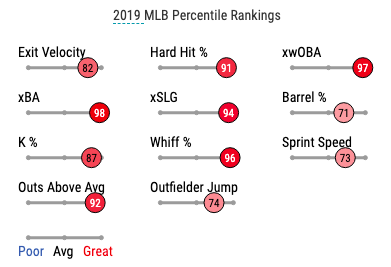Of course the Dodgers locked up Mookie Betts
When the Los Angeles Dodgers acquired Mookie Betts from the suddenly cost-conscious Boston Red Sox back in February, baseball's perennial bridesmaids put a significant amount of pressure on themselves to snap their World Series drought in 2020, with their new superstar just one season away from free agency.
Well, the pressure's off now.
On Wednesday, barely 24 hours ahead of Betts' debut with his new club, the Dodgers locked up the four-time All-Star long term, compelling him to forego free agency with a 12-year extension reportedly worth $365 million, according to ESPN's Jeff Passan. Now finalized, Betts' new contract is the second-largest in baseball history, and while the uncertain winter ahead in the wake of 2020's reduced revenues may have given Betts a smidge of incentive to avoid the open market, this extension seems, in hindsight, practically preordained.
Why wouldn't the Dodgers lock up Mookie Betts? Any team that can afford to, and prioritizes winning over avoiding luxury-tax penalties and long-term cost-effectiveness, would. The Dodgers can, and do, and had the exclusive right to negotiate with him. So they offered him a contract of fair market value, and he accepted. It's not complicated. If the Red Sox offered Betts this exact deal, he likely would've accepted it, too.
In this climate, though, not every ultra-rich team is as committed to contending as the Dodgers, who've won seven straight National League West titles and consistently field some of baseball's highest payrolls, and were poised to remain a juggernaut beyond 2020 with or without Betts thanks to their prodigious player-development system. Between Walker Buehler, top prospect Gavin Lux, and reigning National League MVP Cody Bellinger, the Dodgers have cultivated a robust core of young talent that would've kept them competitive beyond the foreseeable future regardless. Now, though, with Betts atop their lineup and set to patrol right field for the next decade-plus, the Dodgers' continued dominion over the National League is guaranteed, and their long-term outlook is rosier than any other team in baseball.
Betts will be 28 in October and is the arguably the game's second-best player. Some might think more highly of Bellinger or Christian Yelich, but Betts is definitively worse than only Trout. Since becoming a full-time player in 2015, Betts has accrued more WAR than every player except the Los Angeles Angels' superstar, parlaying his full complement of tools into three Silver Slugger awards, four Gold Gloves, and an American League MVP award. Over that span, Betts has slashed .302/.374/.524 while averaging 27 home runs, 43 doubles, 24 stolen bases, and 19 defensive runs saved per season, excelling so comprehensively that it was, to quote a former Red Sox teammate, "frustrating."

(Source: Baseball Savant)
That is precisely the kind of player worthy of almost $400 million, even for those loath to invest too many resources to a single player, which Andrew Friedman had ostensibly been since taking over the Dodgers' baseball operations department in 2014. Despite routinely fielding annual payrolls in excess of $200 million, Friedman only once made a nine-figure commitment to a single player in his six years with the club - an extension for Clayton Kershaw - while the four-year, $55-million deal he gave A.J. Pollock two winters ago constituted his biggest free-agent contract.
It was only a matter of time, though, before the Dodgers, with their nearly unrivaled financial might, shelled out for a megastar, be it Bryce Harper or Gerrit Cole or Anthony Rendon, so when they gave up three decent-to-good prospects and took on David Price's hefty contract for one season of Betts' services, perhaps we should've inferred that he was their preferred target all along, and that they'd never let him reach free agency.
A glance at the club's books only makes his deal seem like more of a no-brainer, in retrospect. The Dodgers don't have a single financial commitment beyond 2022, according to Cot's, giving them acres of financial wiggle room to either extend the cornerstone pieces who will, at that point, be heading into their final seasons of arbitration-eligibility, or beef up Betts' supporting cast through free agency.
Don't be surprised if the Dodgers' three-plus-decade World Series drought is a thing of the past when it's time to make those decisions, though. Don't be surprised if Betts and Bellinger et al. have been fitted for multiple World Series rings by then, either. The addition of Betts over the winter transformed the Dodgers from an elite team into, potentially, a historically dominant one. And by making the easy decision to extend him, they have the chance to become a dynasty.
Jonah Birenbaum is theScore's senior MLB writer. He steams a good ham. You can find him on Twitter @birenball.